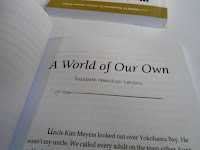One might argue that the diverse backgrounds of the writers are responsible for the uniqueness of each story. True as that may be, the different spice in each story is also attributed to the well honed craft displayed by most of the writers. Albeit being universal, the themes explored therein have been written about before, so kudos to the writers for putting fresh embellishments on them to sustain the readers’ interest.
 |
| Page from 'World of our Own' showing the title story |
They
include war and its effects, racism and segregation, love and marriage, power
and ambition, culture, tradition, modernization, and politics. One would be ill
advised to skip any of the stories, since each has something memorable about
it. Even the ones that start out predictable pull up a tramp card unexpectedly.
The title story by Elizabeth Namakula
Lenana is an example of this. It is a story about rehabilitating child
soldiers, and it shows you what could go right or wrong with such a noble
endeavour. Some would argue that the
tragedy of African child soldier is an overly done subject, but this story will
tell you that it hasn’t; every child soldier has their own story to tell. And
you will agree, as you see the grotesque colours of life through the eyes of
Okello and Rocky.
The Fulani by
Nigerian Yaba Badoe is written with the skill of an orator spinning a tale. It
is a modern love story with ties of the mystical traditional heritage, and the
result is entrancing. ‘As If’ by Hilda
Twongyeirwe is a seemingly mundane scene, that explores conflicts as deep
as home and international politics. Colleen
Higgs’ ’Chasing Butterflies’ is a memorable snapshot; it captures tidbits
of the past and weaves them into the present to create the perfect picture.
 |
| Book cover: 'World of Our Own' |
Mamle Kabu’s ‘Colour Seperation’ is a
well written easy read that captures you from the first word and only lets you
go until the last. The nameless main character’s narrative is easy, candid, and
earnest; it is that quality that makes you turn the pages in Mamle Kabu’s story. ‘Leaving Oxford
Street’ by Molara Wood has an
interesting twist to racial segregation. ‘Burial Rites for Tisa’ by Mary M.Sililo is a serious sad story
that you would not expect to be amusing till you have finished it.
Lillian Tindyebwa’s ‘Endless Distance’
is a story about the affluent and the bitter truth that vice thrives even among
rich Kampala suburbia lives. ‘Master Class’ by Kerstin Norbog is about the intrinsic nature of music, teaching,
and learning. It was translated into English from Swedish by B. J Epstein.
Undoubtedly, World of Our Own and other stories deserves to be
on a reading list. Simple yet not simplistic; it meets the bar of good
art. It also gives glaring comparisons of fiction writing in Uganda vis avis
fiction writing in other African countries. If this is what some of the African
women writers have to offer, it makes one wonder what else is out there.
By Lillian
A. Aujo
No comments:
Post a Comment